Jeff Barrie has been making independent environmental documentary productions as a freelance artist since 1994. His latest project, Arctic Quest, had him bicycling from coast to coast to raise awareness about the importance of protecting the Arctic National Wildlife Refuge in Alaska from oil development.
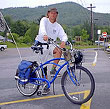
Monday, 26 Jun 2000
TURTON, S.D.
The rain is falling this morning as I write from my dad’s hometown of Turton, S.D. It’s a small farming community in the heart of the Midwest, a place for which I have many fond childhood memories. My cross-country tour is over so I’m going to flash back two weeks and write about the most exciting, intense week of the tour: our arrival in D.C.
I woke up this morning in Culpepper, Vir. Yesterday it was Charlottesville, and before that Newport News. For the last four months, I’ve seen a new home nearly every day as I pedal my bicycle across America.
Today’s ride promises to be a challenging one. Newspaper headlines warn of 100-degree temperatures, and this East Coast humidity makes it even hotter. Below the headlines I spot a picture of myself and Alex Tapia, my support driver, standing on a Culpeper street corner. Yesterday a local reporter interviewed us. Today our story is reaching thousands of readers.
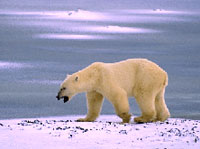
A polar bear in the Arctic National Wildlife Refuge.
Photo: USFWS.
We’re on the adventure of our lives, speaking to countless Americans about the Arctic National Wildlife Refuge that Congress is considering for a possible oil development. It is our mission to make sure Congress knows that America doesn’t want or need the Arctic Refuge turned into an oil field, and that drilling there will not help lower the price of gasoline.
Alex and I first met at the 1995 Youth Environmental Summit in Colorado where 300 young people from around the world came together to learn about various environmental issues, including the Arctic Refuge. In 1996, Alex and four others traveled to Alaska to find the truth about this controversial oil development scheme. I was invited to follow their journey with my video camera and use my documentary filmmaking skills to capture their story. Last year I finished the documentary, <IiArctic Quest: Our Search for Truth, which explores their discoveries in Alaska. Now Alex and I use Arctic Quest as a tool, sharing it with audiences of all ages and all walks of life to illustrate the need to protect this wilderness treasure.
Last year, when I decided to take this bicycle journey across America, Alex volunteered to drive the support vehicle carrying food, water, clothes, camping gear, and a mobile office. An important part of our message is energy efficiency, and I felt that driving an ordinary car might be perceived as hypocritical, so last October I asked Toyota Motor Sales USA if I could borrow one of their revolutionary new 50-mile-per-gallon hybrid Prius cars to serve as my support vehicle. It seemed a bit farfetched that a major corporation would take me seriously and support this grassroots environmental effort, but after numerous follow-up phone calls and three months of uncertainty, I got the final word and we got the Prius.
Now, after four months with this car, Alex and I both believe that gasoline-electric hybrid technology will revolutionize the auto industry and perhaps save some wilderness in the process. Toyota is leading the charge. The Prius is being launched in the U.S. this summer.
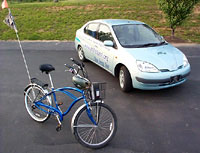
Trusty steeds: my bike and the Prius.
Photo: Arctic Quest.
Together, with the bike and the hybrid car, we represent the voice of those who want to see the Arctic Refuge preserved as wilderness. In the basket mounted to my handlebars, I carry more than 1,000 letters addressed to Congress. We’ve collected these letters over the course of our cross-country journey and have promised to hand-deliver them to each member of Congress. In the past few weeks we’ve scheduled numerous meetings for an all-out one-week congressional campaign. Now we just need to complete the last 85-mile ride to D.C., and today is the day.
Two new pedalers have joined us. Eric Meury from Indiana is one of the truth-seeking stars in “Arctic Quest” who traveled to Alaska in 1996 — he’s ridden with us for 600 miles since Durham, N.C. My sister Jennifer recently finished her seasonal position as a ranger in Joshua Tree National Park and met us in Charlottesville two days ago.
At 11:00 a.m. Alex begins a load of laundry and packs up the car while Eric, Jennifer, and I set out to face the heat and humidity. We cruise through the first 38 miles in a wind-aided two-and-a-half hours. After our lunch break the fatigue sets in and the heat slows our progress. We ride another 10 miles, then stop to rest in the shade. Eric is queasy and feeling the symptoms of dehydration. Alex delivers some much-needed Gatorade. So goes the rest of the day, breaking every 10 miles to seek relief in shade or air-conditioned buildings. By dusk we reach the Potomac.
The sun is setting as we cross the Arlington Memorial Bridge, and we pause in the shadow of the Lincoln Memorial. After four months on the road, this is a sentimental moment for Alex and me. We’re overcome with feelings of nostalgia and anxiety. We’ve both been here before, but never with such an important mission. In the distance, the Washington Monument and Capitol Building stand prominently as powerful symbols marking the end of our 4,600-mile trek and the beginning of our work ahead.
Tuesday, 27 Jun 2000
MINNEAPOLIS, Minn.
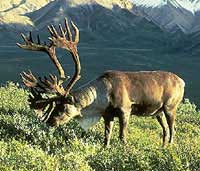
Caribou in the Alaskan wilderness. Coffee, anyone?
Photo: Dean Biggens, USFWS.
This morning I woke up at 4:00 to get an early start on my long drive to Minneapolis, where Alex, Eric, and I are presenting to the staff at Caribou Coffee headquarters. John Puckett, the CEO and founder of Caribou Coffee, started his business after being inspired by the mass caribou herds in Alaskan wilderness. Our bicycle tour is officially over, but our mission to educate continues.
Another flashback to two weeks ago, when we were in D.C. preparing for the grand finale to our bicycle journey:
The morning after particularly long or strenuous rides can be rough. This morning is no exception. I’m weary and irritable from yesterday’s 85-miler and the lack of a full night of rest. “Sleeping in” is a rare luxury on this tour, so it’ll have to wait. No time to rest this morning. Our grand finale arrival on Capitol Hill is tomorrow and we have some last-minute duties to fulfill.
We slept last night in a house in Takoma Park, Md., one of the more liberal communities on the East Coast, located on the edge of the District of Columbia. Two days ago in Culpeper we met some friendly folks who own a house here, and they offered to put us up.
This morning we leave the bikes at our homebase, pile into the Prius, and drive downtown. Here’s the rundown of our first day in D.C:
- 9:00 a.m.: Visit M&R Strategic Strategies, the PR firm handling our media outreach in D.C.
- 10:00 a.m.: Return to car and find our first parking citation, a $50 fine and a request to be towed. Lesson learned: Use caution when parking during rush
hour in D.C. - 10:30 a.m.: Drive to Toyota Dealership in Alexandria, Vir., for a press conference. We’ve been stopping at dealerships across the U.S. to hype the upcoming release of the Prius and to provide a chance for the media to cover our story. This has been very successful for us, generating most of our media coverage.
- 12:00 p.m.: Lunch on the Hill.
- 1:00 p.m.: Visit our friend Athan Manual, director of the Arctic Refuge campaign for the Public Interest Research Group. PIRG’s Arctic Campaign targets oil companies to pressure them into canceling their Refuge drilling plans.
- 3:00 p.m.: Conference call with the organizers of our grand finale.
- 5:00 p.m.: Visit the “Alaska House,” home of the Alaska Wilderness League office. AWL works to protect the Arctic Refuge where the decisions are being made, on Capitol Hill.
Alex and I like to dream big. For tomorrow’s rally we envision a massive 1,000-bike parade through the streets of the Capitol ending with a press conference on Capitol Hill. We’ve enlisted the help of The Wilderness Society, Sierra Club, Alaska Wilderness League, and the office of Rep. Bruce Vento (D-Minn.) to organize our rally and “ride for the Refuge.”
Today was the last conference call, and it sounds like all the pieces are in place. Our D.C. support team has obtained permits from the Metro Police, reserved our gathering spot at the Capitol Building, sent out press releases to all the local and national media, and invited hundreds of cyclists and activists to join us on the last four-mile ride from Lincoln Square Park to the Capitol. Most importantly, members of Congress have been invited to join the procession and speak at the press conference.
The work has been done. Now we wait and see who shows up tomorrow morning. We’re hoping for a big turnout.
Tired and hungry after a long day, we return to our homebase in Takoma Park and stay up until 1:00 a.m. organizing our letters to Congress. We have only a few hours to get ready for our first day on Capitol Hill. Rain starts falling as we fall asleep.
Tomorrow: Making a scene in D.C.
Wednesday, 28 Jun 2000
MINNEAPOLIS, Minn.
I’ve been waiting for this day for nearly five months. This morning I slept until noon.
Alex, Eric, and I spent the night at Dean and Denise’s house here in Minneapolis. Dean and Denise are comedians. Their daughter, Lisette, works for Rep. Bruce Vento’s (D-Minn.) office in D.C. We met her two weeks ago when she was helping us coordinate our press conference on Capitol Hill. Vento is the man who introduced the Morris K. Udall Wilderness Bill (HR 1239) which would protect the coastal plain of the Arctic Refuge as wilderness.
When Lisette caught word that we’d be in her hometown in a couple weeks, she offered us a place to stay. So here we are at her parents’ house.
Two weeks ago was the morning of our official arrival in Washington after our bike trip:
The rain is still coming down as we crawl out of bed at 6 a.m. This is not the kind of weather we had hoped for. If it keeps up, this rain will keep our attendance down. But no sense in worrying. We can change politics, but we can’t change the weather.
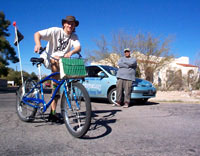
Alex and I on a sunnier day — still thousands of miles from D.C.
Photo: Arctic Quest.
The skies are overcast as we bike down to the rendevous point. But the streets are dry. We arrive at Franklin Square and meet more than 30 supporters with their bicycles. It’s a far cry from the 1,000 bikes we had envisioned, but it doesn’t matter. We have enough enthusiastic supporters to make a scene parading down the three-mile route to Capitol Hill
As we gather at the park, a young man in a shirt and tie stands in the distance taking notes. We soon find out he’s been sent out to observe our event and report back to his boss, Alaska Sen. Frank Murkowski (R).
Murkowski has become our nemesis on this journey. Back in March, as we crossed the west Texas desert, he introduced an Arctic Refuge drilling bill. One month later, he introduced a drilling provision into the national budget bill. That proposal was thrown out by the joint budget committee, but now he’s at it again. This week as we finish our journey he is introducing his energy package which includes a proposal to approve oil development in the Arctic Refuge.
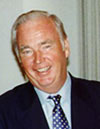
Sen. Murkowski — hope we made him nervous.
Murkowski is unrelenting in his drive to drill in the Refuge. He’s promised to kill any Arctic Refuge wilderness bills that come through his Energy and Natural Resources Committee, despite their unprecedented support in the House and Senate. This morning we’re flattered to know that Murkowski is taking our mission seriously.
Our forces gather in the park, then the excitement begins. With lights flashing and sirens chirping, several motorcycle cops escort our procession to Capitol Hill. We’ve heard it’s not easy to get a police escort in D.C., but here they are, blocking traffic at intersections as we parade through red lights and past curious observers. Driving the Prius, Alex leads our parade.
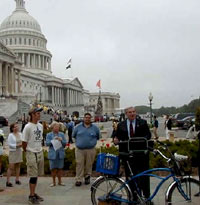
In the shadow of the Capitol — finally!
When we arrive at the Capitol Building, we are greeted by five members of Congress, numerous reporters and TV cameras, and Granny D, the 90-year-old woman who recently walked across America in support of campaign finance reform.
An enthusiastic crowd of over 100 supporters chant “ARCTIC QUEST!” as Alex and I step up to the podium to speak. We share some of our experiences along our cross-country journey and call on Congress to do the right thing — block the short-sighted proposals to develop the Refuge and give it the full wilderness designation it deserves.
“America wants to protect the Arctic National Wildlife Refuge, and we have the letters to prove it!” Alex exclaims.
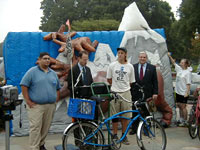
What’s a press conference without an inflatable moose?
We are followed by Sen. Barbara Boxer (D-Calif.), Reps. Steve Kuykendall (R-Calif.), Nancy Johnson (R-Conn.), Earl Blumenaur (D-Ore.), and Edward Markey (D-Mass), then Granny D. It’s an overwhelming moment for Alex and me — surreal, even. Murkowski’s spies lurk in the background.
Unfortunately, one very important member of Congress couldn’t be here with us. Bruce Vento, who sponsored our event today and sponsors the Arctic Refuge wilderness bill we’re promoting, is home in Minnesota undergoing medical treatment. Vento is fighting his own battle with lung cancer.
Though we bemoan the absence of our hero Vento, Alex and I consider the event a success. Several of our respected colleagues express disappointment that we didn’t attract the national media coverage we deserve. But it doesn’t matter to us. There is a lot of big news happening on the Hill today and we still managed to draw media attention and support from Congress, and that’s what really matters. Congress will decide the fate of our last great wilderness.
Now our real work begins — gaining support for the wilderness bills. We have appointments with over 20 representatives and senators scheduled for the next week. Tomorrow morning we have our first congressional visit.
Thursday, 29 Jun 2000
MINNEAPOLIS, Minn.
Two
weeks ago today began the craziness on Capitol Hill. Alex, Eric, and I rushed from one congressional meeting to another, from one office building to the next, back and forth across the Hill. This is how the day went:
Our first congressional meeting isn’t until 10:00 a.m., but we get up extra early to attend Sen. Frank Murkowski’s (R-Alaska) energy bill hearing. Murkowski wants to reduce our nation’s oil imports from 57 percent of total consumption to 50 percent by the year 2010, claiming this is vital to our national security. His approach to decreasing imports is to increase domestic production, with little mention of reducing consumption through energy efficienc
Before the discussion begins in the Dirksen Senate Building, I approach the panel and introduce myself to Murkowski. We shake hands. I tell him about my mission.
“Hi Senator Murkowski, my name is Jeff Barrie. I just rode my bicycle across America in an effort to protect the Arctic Refuge from oil development.”
He keeps his head and eyes down, seeming to resist making eye contact. But he listens, then politely explains how important oil is to the Alaskan economy. I can only imagine what he’s thinking.
Eric joins me as I take the opportunity to greet another panel member, Colorado Sen. Ben Nighthorse Campbell (R), who in 1995 encouraged a certain group of young people to “look beyond the rhetoric and find the truth” about the Arctic National Wildlife Refuge. His words inspired the quest to Alaska in 1996 that is portrayed in my documentary Arctic Quest: Our Search for Truth. Campbell reminds me that he is on the other side, but shows respect for my effort.
Later in the day, Alex and I encounter Campbell again, this time in the tunnels beneath the Capitol. We jump into his subway car as he makes his way to a vote on the Senate floor. As the three of us sit side-by-side, crammed in the seat, Alex and I thank him for his part in inspiring our life’s mission. He declines to accept a complimentary VHS copy of Arctic Quest.
When Campbell ran for Senate in 1994, he promised the people of Colorado that he would work to protect the Arctic National Wildlife Refuge from oil development. After flip-flopping his position several times, he finally voted in favor of developing the Refuge. He’s since become an ardent supporter of development.
The chance meetings continue throughout the day. Alex recognizes Tennessee Sen. Fred Thompson (R) in the halls, makes an introduction, and tells him of our quest and of the 200 letters we’ve collected for him. Thompson too has wavered on this issue, voting on our side in 1995, and against us in 2000. Murkowski puts a lot of pressure on these guys to vote his way.
Later, as we walk to another congressional visit, Alex spots Rep. Mark Udall (D-Colo.), son of the late Morris K. Udall. Mo Udall is the namesake of the wilderness bill that will protect the Arctic Coastal Plain. We are honored, humbled, and amazed at the coincidence and timing of our visit to D.C. and the people we’ve met.
At 11:00 we meet with my representative from home, Steve Kuykendall (R-Calif.), who listens to our message. We ask him to cosponsor HR 1239, the Morris K. Udall Wilderness Bill. He is a believer in Toyota’s hybrid technology that promises to reduce our nation’s demand for petroleum, but he wants to hear from the other side before he makes a decision on the wilderness bill. We leave him with letters from his constituents along with a copy of Arctic Quest, which he promises to watch.
The Morris K. Udall bill currently has 168 cosponsors in the House. The Senate version has 27. This is strong support, especially for a wilderness bill, but we need a majority (that’s 218 in the House and 51 in the Senate) before this bill can move to a vote. Normally it’s not so difficult to move a bill to a vote, but Rep. Don Young (R-Alaska) and Sen. Murkowski chair the committees through which these bills must pass on their way to the floor. They have vowed to kill these bills, so we need a majority of cosponsors in order to bypass their committees.
It is not easy gaining cosponsors. Members of Congress want to weigh the evidence on both sides and want to know how their constituents feel about the issue before making a decision. When we make our visits, we leave their staff with a “lobby kit” which includes literature about the Arctic Refuge, the Toyota Prius, and the local Gwichin people; a copy of the bill; a list of cosponsors; a cover letter from Alex and myself; and a pile of letters from constituents. If the representative or senator wants more information, we do our best to get what they need. Then we follow up with phone calls in the weeks after the meeting.
We’d like to have at least one new cosponsor before we leave town next week, but we must be patient. Right now we’re planting seeds. Tomorrow we have another day packed with meetings and a special presentation at the Department of Interior.
Friday, 30 Jun 2000
LAKE IN THE HILLS, Ill.
Today I’m writing from my aunt Beth and uncle Chris’s house in Illinois, where they live with their five children. I’m on vacation for a few days, recovering from the tour and getting ready for the next phase. In two weeks I’m going back to Tennessee, to build on the work we accomplished there and to continue fighting to protect the Refuge.
Two weeks ago today, Alex, Eric, and I continued our visits on Capitol Hill:
Today we face one of our most challenging congressional visits. We meet with a legislative aide in the office of Sen. John McCain (R-Ariz.), who earlier this year quit his bid for the presidency.
McCain’s aide cuts straight to the chase and explains that although the senator understands this is a national issue, he is inclined to respect the voice of the local native groups in Alaska that support development. He explains how McCain’s office has been heavily lobbied by tribes in Alaska that support development, and when the pro-wilderness groups have come to him, they don’t have the scientific evidence to prove that oil development would indeed have a negative impact in the Arctic Refuge.
The thing that perplexes us the most about this meeting is the aide’s assertion that numerous pro-development tribes from Alaska have lobbied McCain’s office. We’ve been to Alaska and studied this issue extensively. We’ve learned of two opposing native groups that have taken a strong stand on this issue. The Inupiat Eskimos from the North Slope, who reap hundreds of millions of dollars in annual revenues from oil development operations, lobby very aggressively for oil development in the Arctic Refuge. On the other hand, the Gwich’in people, who face the loss of their subsistence way of life, adamantly oppose development. The Gwich’in people subsist on a massive porcupine caribou herd that would be directly impacted by the proposed development. We’ve spoken with both groups and have sided with the Gwich’in, whose stance is not based on money or greed, but on a sincere attachment to their cultural integrity and very survival.
Today we’ve learned the importance of being prepared and being thorough. Though we follow our hearts and understand this issue extensively, we also need to be able to substantiate our position. Letters from constituents are meaningful, but “science” makes decisions in many people’s eyes. It is doubtful that we’ll change McCain’s position on this issue, but we need to offer another perspective, one that apparently he hasn’t seen.
We have several more meetings today, but Fridays are quiet on the Hill. Next week will be jam-packed with more congressional visits, then we leave D.C.
Two days ago at our rally on Capitol Hill, we met Stephanie Hannah from the office of Secretary of Interior Bruce Babbitt. Stephanie came to introduce herself and invite Alex and me to make our presentation to the staff at the Department of Interior. This is our chanc
e to show President Clinton our message and deliver letters to his attention. There are rumors in this town that Clinton is considering declaring the coastal plain of the Arctic Refuge a national monument before the end of his term. We want to help him make that decision, which would provide one more significant layer of protection for this wilderness treasure. Vice President Al Gore has pledged to continue working toward protecting the Arctic Refuge in the next administration. Republican presidential nominee George W. Bush, on the other hand, wants to open the Refuge to drilling.
This issue is hot, and we couldn’t have timed our involvement any better. The full impact of our actions is difficult to measure, but we know we got the attention of Congress and the Clinton administration, and we’ve reached millions of Americans with our message. The rest will be resolved soon, we hope.
I’ve enjoyed sharing this week in the life of Arctic Quest. We’d love to hear from you. Please email us at arcticquest@shoutmail.com. You can read more about our adventures crossing America by visiting our website.


